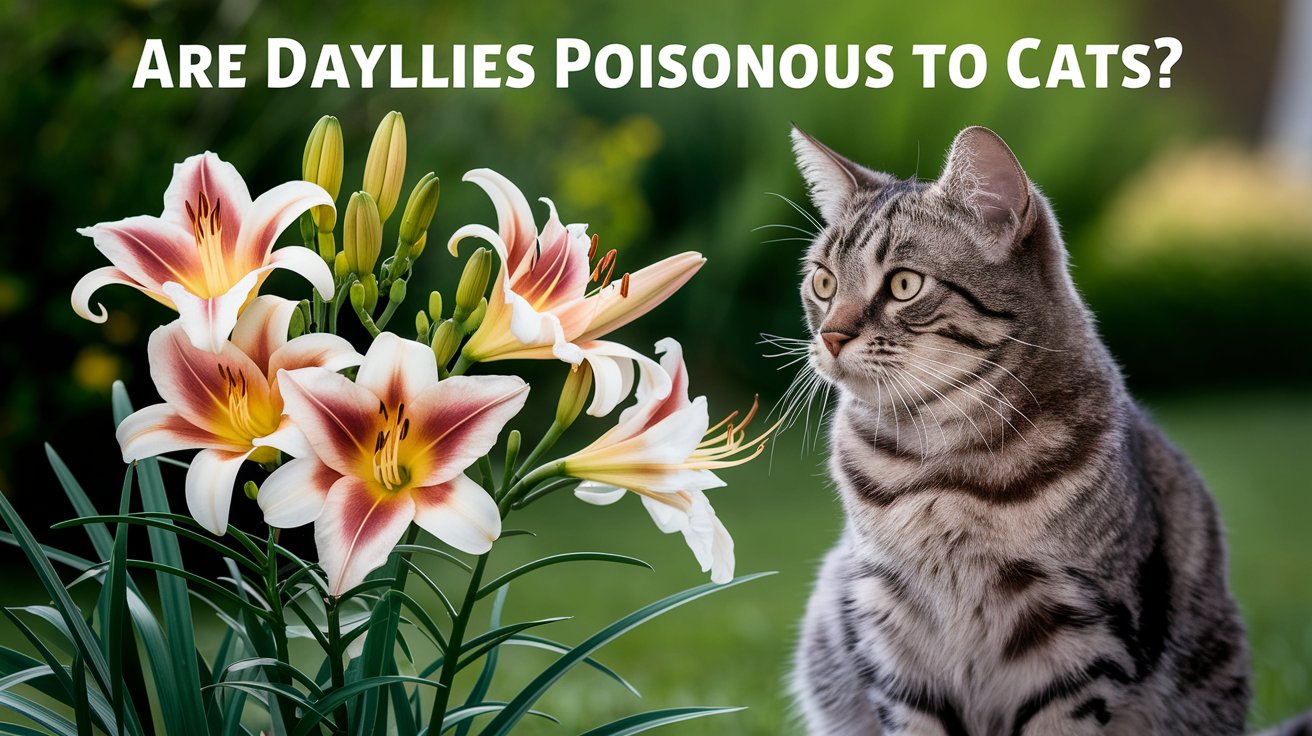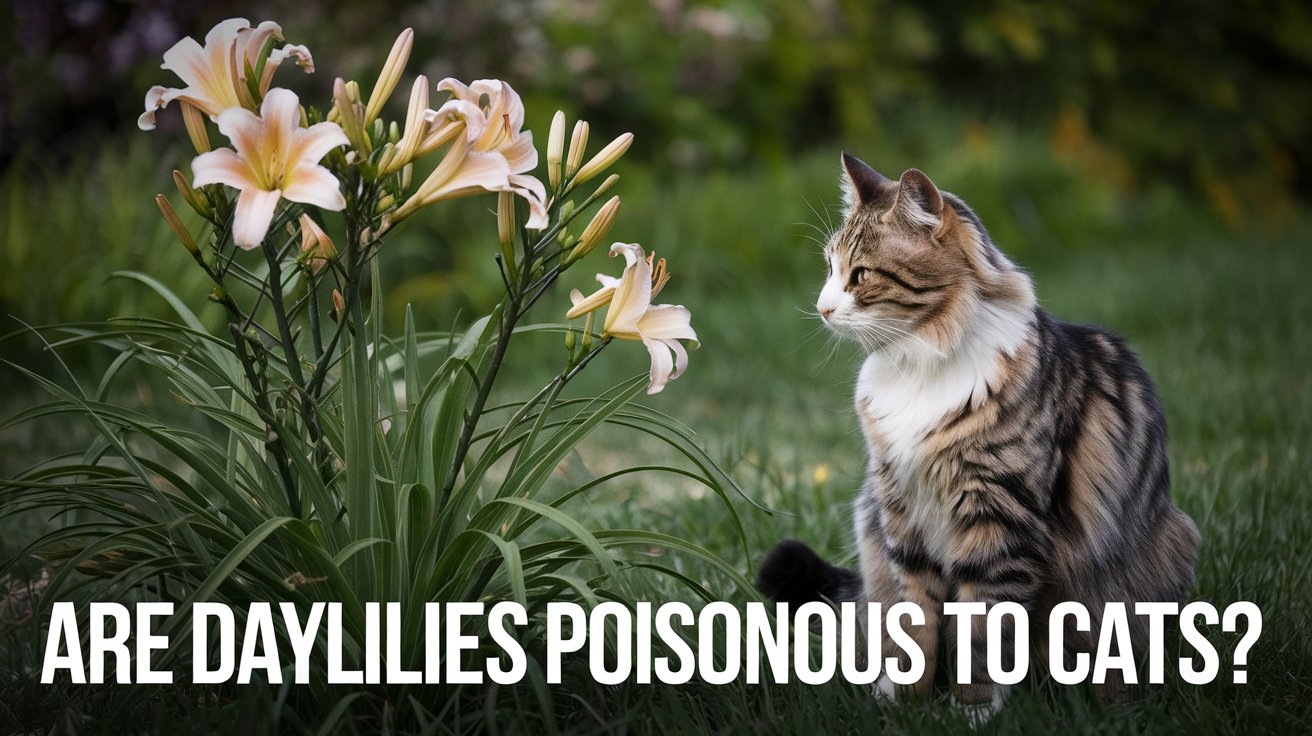
Are Daylilies Poisonous To Cats? Everything You Need to Know
Why Are Daylilies Poisonous To Cats?
Daylilies contain highly toxic compounds to cats, though the exact substance causing the toxicity remains unknown. These beautiful plants are perilous because every part of the daylily is dangerous for cats. This includes the leaves, petals, stems, pollen, and even the water from a vase that holds cut daylilies. A small bite or even grooming pollen off their fur can be enough to trigger symptoms of poisoning in cats.
While daylilies are harmless to humans and dogs, they are highly toxic to cats. Consuming even the smallest amount can result in severe kidney damage, making it crucial to act swiftly if exposure occurs.
Symptoms of Daylily Poisoning in Cats
Recognizing the signs of daylily poisoning early can make a significant difference in the outcome for your cat. The onset of symptoms can be rapid, and they typically begin within 6 to 12 hours of ingestion. Here are the most common symptoms to watch for:
- Vomiting: A frequent and early sign of daylily poisoning in cats.
- Lethargy: A cat that has ingested daylilies may seem unusually tired or disinterested in activities.
- Loss of Appetite: Your cat may refuse food after coming into contact with daylilies.
- Dehydration: Due to vomiting and lack of eating, dehydration can set in quickly.
- Increased Urination or Absence of Urination: As kidney failure progresses, cats may exhibit abnormal urination patterns, either going more frequently or not at all.
- Tremors and Seizures: In severe cases, cats may suffer from neurological symptoms such as tremors or seizures.
If left untreated, daylily poisoning can lead to fatal kidney failure in as little as 24 to 72 hours.
How Does Daylily Poisoning Affect a Cat’s Kidneys?
When a cat ingests any part of a daylily, the toxins directly impact the kidneys, leading to acute kidney failure. This condition impairs the kidneys’ ability to filter waste, causing a buildup of toxins in the cat’s system. Without swift intervention, the damage can be irreversible, and the cat may require long-term treatment or even euthanasia if the kidneys fail.
Acute kidney injury can lead to a total shutdown of the cat’s ability to produce urine, which is a tell-tale sign of daylily toxicity. Once the kidneys fail, the cat’s chances of survival decrease rapidly.

What to Do If Your Cat Ingests Daylilies
If you suspect that your cat has come into contact with daylilies, immediate action is critical. Here’s what you should do:
- Call a Veterinarian Immediately: This is a life-threatening emergency, and time is of the essence. Your vet may instruct you to induce vomiting if the ingestion happened recently, but this should only be done under veterinary guidance.
- Visit the Animal Hospital: Prompt medical attention is crucial. Your veterinarian may administer activated charcoal to prevent further toxin absorption, followed by intravenous fluids to support kidney function.
- Blood and Urine Tests: These tests will be conducted to assess the severity of the poisoning and the level of kidney damage.
- Hospitalization and Monitoring: Most cats with daylily poisoning require hospitalization to receive aggressive IV fluids and close monitoring of kidney function over several days.
Preventing Daylily Poisoning in Cats
The best way to protect your cat from daylily poisoning is by eliminating any potential exposure to the plant. Here are some preventative measures to consider:
- Remove Daylilies from Your Home and Garden: If you have daylilies growing in your yard, consider replacing them with non-toxic alternatives such as roses or sunflowers. Indoors, be cautious of floral arrangements containing daylilies.
- Educate Others: If friends or family bring flowers as gifts, kindly ask them to avoid bringing any lilies or related plants into your home.
- Monitor Your Cat’s Outdoor Activities: If your cat spends time outdoors, supervise them closely to ensure they don’t come into contact with daylilies or other poisonous plants.
Other Plants That Are Toxic to Cats
While daylilies are one of the most dangerous plants for cats, they are not the only ones to watch out for. Some other common houseplants and garden flowers that are toxic to cats include:
- Easter Lilies (Lilium longiflorum): A single leaf or flower petal can cause fatal kidney failure in cats.
- Peace Lilies (Spathiphyllum): While not as toxic as daylilies, these plants can cause severe irritation and vomiting in cats.
- Azaleas: Can cause vomiting, diarrhea, and heart problems in cats.
- Tulips and Daffodils: The bulbs of these flowers are highly toxic and can cause severe gastrointestinal distress.
Safe Alternatives to Daylilies for Cat Owners
If you love having flowers in your home or garden but want to keep your feline friend safe, there are plenty of non-toxic alternatives to choose from. Some cat-friendly options include:
- Spider Plants (Chlorophytum comosum): Known for their air-purifying qualities and safe for curious cats.
- Marigolds (Tagetes spp.): Bright and colorful flowers that won’t harm your pets.
- Zinnias: Another safe option that adds vibrant color to your garden.
- Basil and Rosemary: Not only are these herbs non-toxic to cats, but they also serve a culinary purpose in your home.

FAQs About Daylilies and Cats
Are daylilies toxic to dogs?
No, daylilies are not toxic to dogs, but they pose a significant threat to cats.
How long does it take for symptoms of daylily poisoning to appear in cats?
Symptoms typically appear within 6 to 12 hours after ingestion.
Can cats recover from daylily poisoning?
If treated promptly, some cats can recover fully from daylily poisoning. However, the prognosis is poor without immediate intervention.
What part of the daylily is toxic to cats?
Every part of the daylily is toxic to cats, including the leaves, petals, stems, pollen, and even water from a vase containing daylilies.
Can pollen from daylilies poison my cat?
Yes, even daylily pollen can be toxic if a cat licks it off its fur or paws.
What should I do if my cat comes into contact with daylilies?
Seek veterinary care immediately. This is an emergency that requires prompt attention to prevent fatal kidney failure.
Conclusion
The question, “Are daylilies poisonous to cats?” is one that every cat owner should take seriously. Daylilies are highly toxic and pose a grave risk to feline health, primarily affecting the kidneys and leading to potentially fatal outcomes if not treated swiftly. By recognizing the symptoms of poisoning, acting quickly, and eliminating these plants from your home or garden, you can protect your beloved cat from this preventable danger.
If you suspect that your cat has ingested any part of a daylily, contact your veterinarian immediately to ensure the best chance of recovery. Preventive measures, such as removing these plants from your environment, can save your cat from unnecessary harm and ensure a happy, healthy life.

I am a dedicated writer and expert in cats, with years of experience studying feline behavior, health, and breeds. Passionate about sharing my knowledge, I provide valuable insights and practical advice to help cat lovers understand and care for their furry companions. When not writing, I enjoy spending time with my beloved cats, continually learning and deepening my expertise.

Leave a Reply